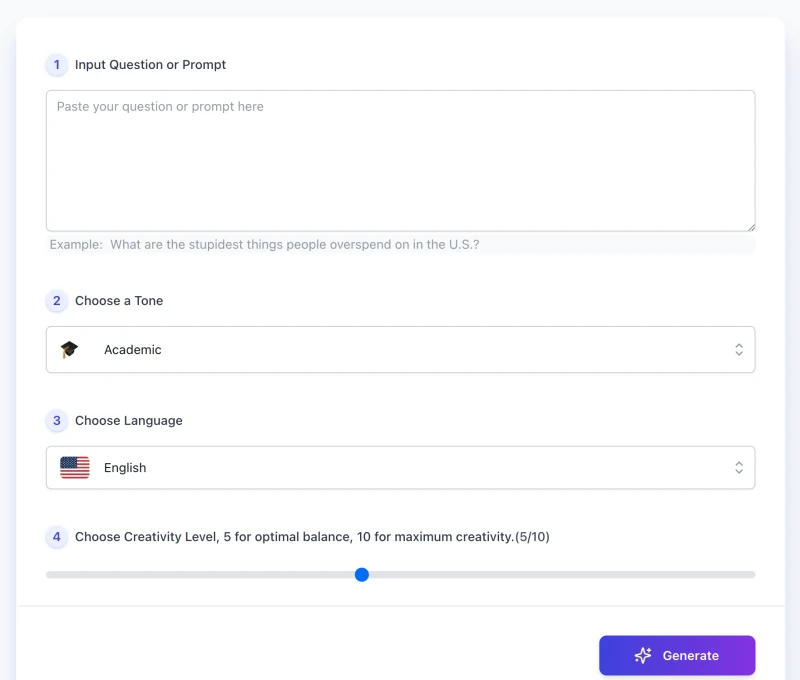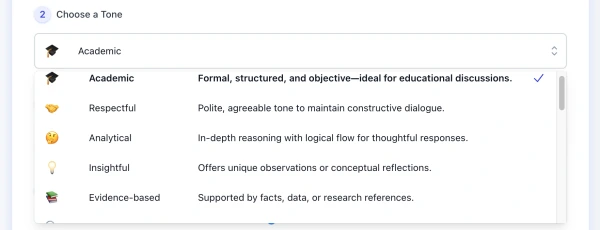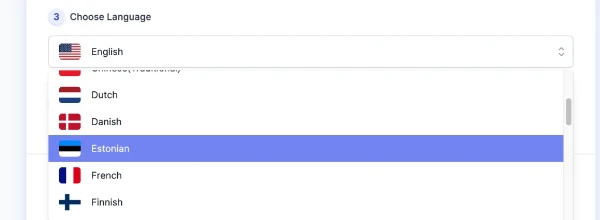Free AI Tools. No Sign-Up Required. Full Access.
AI Discussion Board Response Generator
Free AI tool to write academic discussion responses — no sign-up, perfect for students and online learners.
Combine the current tool with these other tools to work more efficiently.
AI Answer Generator
AI Comments Generator
AI Message Response Generator
AI Comment Reply Generator
AI Facebook Post Comment Generator
AI Instagram Comment Generator
AI YouTube Comment Generator
AI TikTok Comment Generator
AI Reply Instagram Comment Generator
AI Tweet Creator
Discover other tools with functions and purposes similar to the one you are currently viewing.
- AI Discussion Post Generator

- AI Comment Reply Generator

- AI Message Response Generator
- AI Feedback Response Generator

- AI Comments Generator

- AI Review Response Generator

- AI Answer Generator

- AI Email Reply Generator
- AI Dialogue Generator

- AI Reply Instagram Comment Generator
- AI Question Generator

- AI Write Message Generator
Discover the tools most favored and highly-rated by users on our website.
Explore more AI tools in these related categories
AI Writing tools generate, or enhance text content for various writing tasks.
AI tools that automatically create text content for your images, audio, or video from user prompts.
AI tools designed to assist with research, studying, writing, and academic data analysis tasks.
This is the AIFreeBox AI Discussion Board Response Generator—a free online tool that helps you write thoughtful, well-structured replies for forums, class discussions, and online communities.
On this page, you’ll learn what the tool can—and can’t—do, where it works best, how to use it effectively, and how to handle common issues. From tone selection to writing tips, from limitations to FAQs, everything here is designed to help you contribute more clearly, confidently, and meaningfully to any discussion.
What Can AIFreeBox AI Discussion Board Response Generator Do?
Built on AIFreeBox’s custom language engine, this tool analyzes your prompt, identifies its intent, and writes a structured reply in a tone that matches your goal. It’s designed to reflect how people naturally think and communicate—balancing clarity, tone, and relevance across different contexts.
We didn’t build this tool to crank out quick content or replace your voice. It was designed to help you think through your response, shape your ideas more clearly, and participate in discussions with greater confidence. By choosing different tones—whether thoughtful, respectful, assertive, or reflective—you can express your stance, respect different views, and move the conversation forward with clarity and intent. The goal is simple: to support real contributions—not shortcuts.
AIFreeBox Discussion Reply Generator vs. Generic Text Generator
Not all writing tools are built for real conversations. Here’s how this tool compares to a generic text generator—so you can see what makes it different.
| 🧩 Feature | Discussion Reply Generator | Generic Text Generator |
|---|---|---|
| 🎯 Purpose | Helps you respond meaningfully in real discussions | Generates general-purpose text with no context |
| 🗣 Tone Control | Lets you choose a tone to match your intent | Often lacks style control or emotional nuance |
| 🧠 Structure | Organizes replies with logical flow and clarity | May produce bloated or unfocused paragraphs |
| 🌍 Language Support | Supports 33 languages for multilingual discussions | May have limited or uneven language coverage |
| 🤝 Human–AI Role | Acts as a writing partner, not a replacement | Focuses on auto-generating full text outputs |
| 📚 Context Awareness | Designed for prompts from forums, classes, communities | Not optimized for real-world dialogue or reply structure |
Recommend Use Cases and Strengths
| Use Case | What It Helps With | Who It’s For |
|---|---|---|
| Class Discussions | Organizes your thoughts and helps you respond clearly to prompts or peers. | Students, online learners, educators |
| Professional Forums | Assists in writing replies that are thoughtful, respectful, and well-structured. | Industry professionals, team members, moderators |
| Community Platforms | Supports engaging in conversations without losing your voice or intent. | Volunteers, hobbyists, organizers |
| Multilingual Discussions | Helps you respond naturally in 33 supported languages. | Non-native speakers, international groups |
How to Reply a Discusion Post with AIFreeBox AI:
Step-by-Step Guide

Step 1. Enter your question or prompt
Type the topic you want to respond to—this could be a forum post, a discussion assignment, or a comment that needs a reply. Be as clear and specific as possible so the tool understands the context.
Step 2. Choose a tone that fits your intent

Select how you want your reply to sound—academic, respectful, assertive, reflective, and more. The tone you choose helps express your stance, show consideration for others, and guide the discussion in a meaningful way.
Step 3. Select your language

The tool supports 33 different languages. Choose the one that feels most natural to you, or fits the audience and setting of the discussion.
Step 4. Adjust the creativity level (optional)
Use the slider to set how flexible or focused the response should be. A mid-level setting offers balanced replies. Higher creativity may introduce more expressive or varied wording.
Step 5. Click “Generate”
The tool will generate a reply based on your input, tone, and language. You can copy it directly or refine it to better match your voice and message.
Each step is designed to help you participate with more clarity and intention—whether you’re adding to a conversation, questioning an idea, or simply making your point in a thoughtful way.
Step 6: Report a Bug & Feedback (Real Human Support)

If something doesn’t work or feels off, click “Report Bug.” A real person reviews these reports and responds—your feedback directly improves the tool. We take user experience seriously and are ready to help.
Remember: This process is designed to help you create replies that are clear, respectful, and true to your intent. The AI provides structured drafts, tone options, and guidance—but you decide the topic, stance, and final words. It’s a writing partner, not a replacement, supporting you to express yourself with more clarity and confidence.
Tips for Better Results
As someone who’s written thousands of replies across forums and class threads, I’ve learned that even with AI tools, good output starts with how you guide it. Below are some tips to help you get more accurate, more thoughtful, and more “you” in every reply.
🛠️ How to Get the Output You Actually Want
- 🎯 Be specific with your prompt
Mention what the reply is responding to. Don’t just write “thoughts on technology”—write “how AI affects student learning in high schools.” - 🗣 Pick a tone that fits your role
Academic tone for assignments, Reflective for peer responses, Respectful for sensitive topics. The right tone helps your message land. - 🔄 Regenerate if needed
If it feels too formal or off-topic, change one thing—tone, creativity level, or even a word in your prompt—and try again. - 📏 Use mid creativity for balance
Creativity 4–6 often produces the most useful structure without going off-topic. You can adjust up or down if the draft feels too stiff or too loose. - 🌍 Write in your native language if stuck
The tool supports 33 languages. You can write prompts in your own language to reduce friction, then translate later if needed.
🔍 Advanced Tips: Personalize, Review, Take Ownership
- 🧠 Know what you’re trying to say
Before hitting “Generate,” ask yourself: what’s my stance? Am I agreeing, disagreeing, or adding a new view? - 👁 Check the tone and message before posting
AI drafts are helpful, but not perfect. Make sure the response fits the platform, the topic, and your own communication style. - ✍️ Add your own voice
Include a sentence or phrase from personal experience, a question, or a follow-up. That’s what makes your reply feel real. - 🧩 Split longer questions into parts
If your prompt has multiple ideas, break it into two. You’ll get clearer, more focused replies that are easier to adjust. - ✅ You’re still the final editor
AI supports you with structure, tone, and flow—but the content is yours. You own the message, not the machine.
This tool gives you a strong starting point—a clear structure, a tone that fits, and wording that avoids repetition or filler. But the real power comes from you: knowing your intent, making thoughtful edits, and saying something that genuinely adds to the conversation.
Good vs. Not-So-Good Examples
Example 1: Be Specific
❌ Not-so-good:
“What do you think about technology in schools?”
This is too broad. The tool may struggle to choose a direction—privacy? devices? online learning?
✅ Better:
“How does the use of AI tools like ChatGPT affect how students learn and complete assignments in high school classrooms?”
This version is focused and clear. It gives the tool enough context to generate a more relevant, structured reply.
Example 2: Match Tone to Intent
❌ Not-so-good:
Tone: Assertive
Prompt: “Can someone explain why people still don’t recycle?”
With an assertive tone, this could sound accusatory or closed-off, even if that’s not your intent.
✅ Better:
Tone: Inquisitive
Prompt: “Why do some communities still face challenges with recycling, and what could help improve participation?”
Same topic, but the tone invites dialogue. It reflects curiosity and encourages others to share ideas, not defend themselves.
Style System Overview
You can choose from a variety of tone styles depending on what kind of message you want to send. Here’s a simple overview to help you find the one that fits your reply.
- 🎓 Academic — For formal, structured, and objective replies. Great for class discussions or coursework.
- 🤝 Respectful — Polite and balanced; useful when responding to sensitive or opposing views.
- 🤔 Analytical — Breaks things down logically and step by step; ideal for reasoning through ideas.
- 💡 Insightful — Offers thoughtful takes or observations that add new depth to the topic.
- 📚 Evidence-based — Backs points with facts or examples; helpful in more research-heavy conversations.
- 🔍 Curious — Gentle, open-ended tone used for asking questions or exploring new ideas.
- 🙌 Supportive — Encouraging and positive; perfect when you want to validate or uplift someone’s point.
- 🎯 Concise — Straight to the point; avoids fluff and focuses on clarity.
- 🧩 Constructive — Suggests improvements or alternative views in a helpful and kind way.
- 🗣️ Assertive — Clear and confident without being rude; shows where you stand.
- 🧭 Balanced — Weighs both sides; great when a topic has nuance or debate.
- 📝 Reflective — More personal or experience-based; often used for introspective replies.
- 📣 Persuasive — Aimed at gently convincing or encouraging action.
- 🌍 Empathetic — Shows understanding and care, especially in emotional or sensitive topics.
- 🔧 Practical — Focused on real-world tips, steps, or problem-solving.
- 😄 Friendly — Casual, light tone for more informal or social discussions.
- 🧑💼 Professional — Polished and business-appropriate; best for workplace threads.
- 🔥 Bold — Confident and direct, for when you want to make a strong point.
- 🧠 Philosophical — Big-picture or idea-driven; used for abstract, ethical, or conceptual discussions.
Known Limitations and Common Issues
| What Might Happen | Why It Happens | What You Can Do |
|---|---|---|
| The reply feels too generic | The input prompt is vague or broad | Be more specific—focus on a clear angle or context |
| The tone doesn’t match your intent | Selected tone may not align with the question type | Try switching to a softer or more neutral tone |
| Reply sounds too long or formal | Some tones (e.g. Academic) lean toward longer responses | Choose a simpler tone like Friendly or Concise, or edit the output |
| The reply misses part of the question | Prompt may contain multiple unrelated points | Split your input into two separate prompts |
| Language feels slightly off | Machine translation may not fully match regional expressions | Edit phrases manually, or regenerate with a different tone |
FAQs
Do I need an account to use this tool?
No. You can use the tool freely without creating an account.
Can I use this for academic assignments?
Yes—but treat the output as a starting point. Edit it to reflect your own voice, understanding, and any course requirements.
What if the reply doesn’t sound right?
Try adjusting the tone, simplifying your prompt, or lowering the creativity level. You can also regenerate with small changes for better results.
Can it understand complex or technical topics?
To some extent, yes. But for detailed or specialized subjects, try providing more context or narrowing the focus of your prompt.
Is there a way to make the replies shorter?
Yes. Choose a simpler tone like “Concise” or “Friendly,” or trim the response manually after generation.
What languages does the tool support?
The tool currently supports 33 languages, including English, Spanish, Portuguese, French, German, Japanese, Chinese, and more.
Creator’s Note
This tool wasn’t built to write for you. It was built to write with you.
When I started designing the AI Discussion Board Response Generator, the goal was never to automate participation or replace personal thought. It was to create something small and useful—something that helps you organize your thinking, express your ideas with clarity, and take part in conversations with a bit more confidence.
The AI behind this tool isn’t here to impress. It’s here to support. The words it generates are only as valuable as the intent you bring to them. And while it can help with structure, tone, and flow, the voice is still yours.
Thanks for using it thoughtfully.
—Matt Liu
2025-10-21
🧠 Try it out now — free, online, and ready when you are.
Respond with clarity and confidence — let AI help you organize ideas and write thoughtful replies.